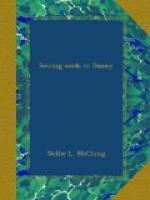Thus admonished, Pearlie, with flaming cheeks began the story. She tried to make it less personal, but at every change Danny screamed his disapproval, and held her to the original version, and when it was done, he looked up with his sweet little smile, and said to Mrs. Francis nodding his head. “You’re it! You’re the lovely pink lady.” There was a strange flush on Mrs. Francis’s face, and a strange feeling stirring her heart, as she hurriedly rose from her chair and clasped Danny in her arms.
“Danny! Danny!” she cried, “you shall see the yellow birds, and the stairs, and the chocolates on the dresser, and the pink lady will come to-morrow with the big parcel.”
Danny’s little arms tightened around her neck.
“It’s her,” he shouted. “It’s her.”
When Mrs. Burton Francis went up to her sitting-room, a few hours later to get the “satchel” powder to put in the box that was to be tied with the store string, the sun was shining on the face of the Madonna on the wall, and it seemed to smile at her as she passed.
The little red book lay on the table forgotten. She tossed it into the waste-paper basket.
Close beside Mrs. Francis’s comfortable home stood another large house, weather-beaten and dreary looking, a house whose dilapidated verandas and broken fence clearly indicated that its good days had gone by. In the summer-time vines and flowers grew around it to hide its scars and relieve its grimness, pathetic as a brave smile on a sad face.
Dr. Barner, brilliant, witty and skilful, had for many years been a victim of intemperance, but being Scotch to the backbone, he never could see how good, pure “Kilmarnock,” made in Glasgow, could hurt anyone. He knew that his hand shook, and his brain reeled, and his eyes were bleared; but he never blamed the whiskey. He knew that his patients sometimes died while he was enjoying a protracted drunk, but of course, accidents will happen, and a doctor’s accidents are soon buried and forgotten. Even in his worst moments, if he could be induced to come to the sick bed, he would sober up wonderfully, and many a sufferer was relieved from pain and saved from death by his gentle and skilful, though trembling, hands. He might not be able to walk across the room, but he could diagnose correctly and prescribe successfully.
When he came to Millford years ago, his practice grew rapidly. People wondered why he came to such a small place, for his skill, his wit, his wonderful presence would have won distinction anywhere.
His wife, a frail though very beautiful woman, at first thought nothing of his drinking habits—he was never anything but gentlemanly in her presence. But the time came when she saw honour and manhood slowly but surely dying in him, and on her heart there fell the terrible weight of a powerless despair. Her health had never been robust and she quickly sank into invalidism.




